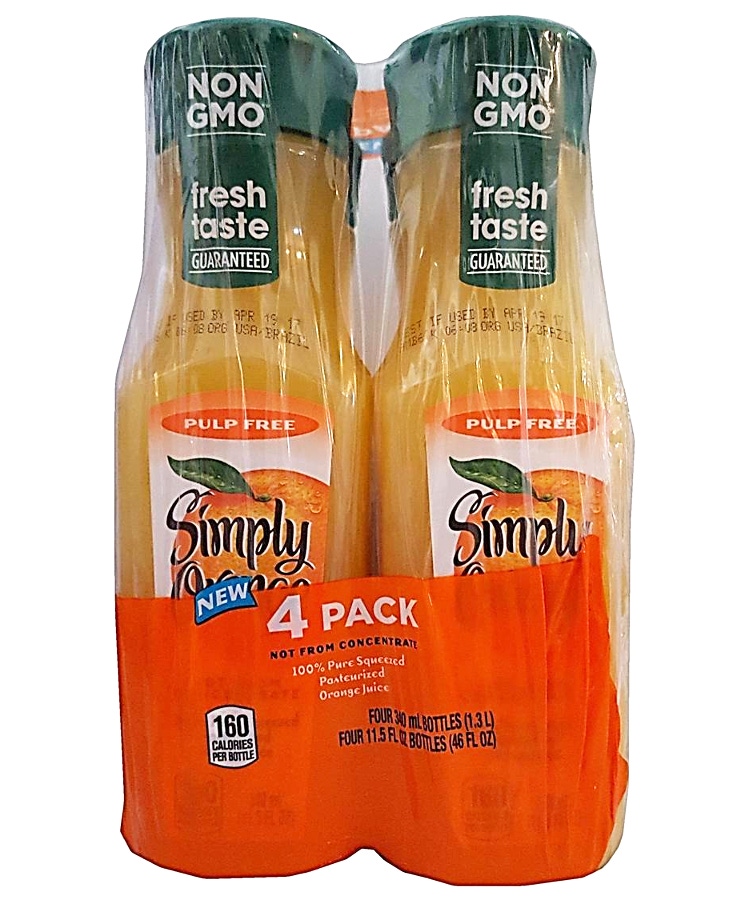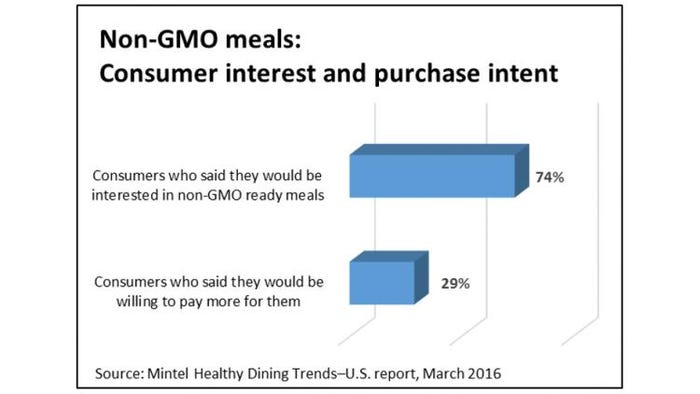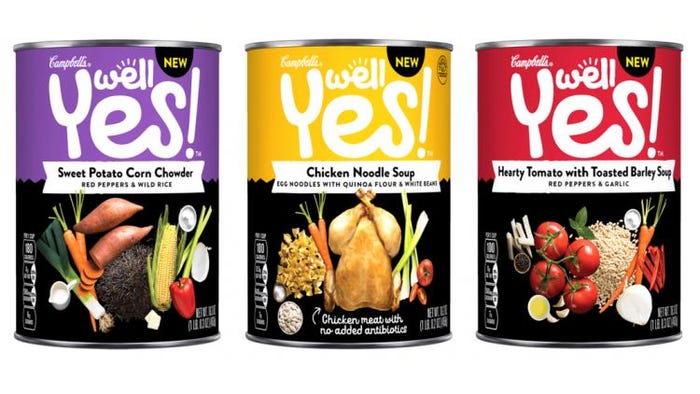GMO labeling remains a ‘front-panel’ issue for brands
May 16, 2017

In recent years, public awareness campaigns have aimed to inform consumers of the presence of genetically modified organisms (GMOs), but stopped short (so far) of eliminating them. According to Mintel Reports, consumers do not avoid GMOs on quite the same level as artificial preservatives, flavors and sweeteners. That said, sizable portions of Baby Boomers (34%) and Millennials (29%) are actively avoiding genetically modified foods.
Perhaps the bigger picture is that consumers are focused in general on achieving overall health. Seeking out whole ingredients and food that aren’t processed or otherwise altered is one way people define “healthy.” Interest in natural and organic ingredients and products “free from” artificial preservatives, colorings and synthesized chemicals has remained steady.
According to Mintel’s Free From Food Trends, GMO-free is the top issue for 13% of consumers who purchase any free-from food. By contrast, 27% rank “trans fat-free” as the most important issue when buying food. But, tallying the top two rankings, GMO-free claims are cited by a quarter of respondents, the same percentage who are looking for preservative-free claims. However, Mintel’s Global New Products database actually shows a 5% decline between January 2012 and December 2016 in the percentage of new food introductions in North America with GMO-free on-pack claims.
Nutritional education has been a big theme in 2017 for food regulations and labeling. In an era when sentences and words are being replaced with images, including emojis or other pictorial representation, symbols are increasingly being incorporated into product labels. This type of information strives to make nutritional information easier—and faster—to understand. This type of information aligns with Mintel’s trend Help Me Help Myself, which states that consumers are seeking tools that help them stay on track with their personal health goals.
Other changes for nutrition labeling seen in 2017 and going forward will continue to influence the conversation about nutrition, as seen in the U.S. with the changes the U.S. Food and Drug Administration has made to the nutritional facts labels. The overabundance of added sugars in the diet has received attention around the world, resulting in new labeling initiatives and taxes on sugary beverages. The addition of information about added sugars on nutritional fact labels in the U.S. as well as sugar taxes in countries and cities around the world will shift the nutritional conversation from condemning fat to vilifying sugar.
While the GMO issue continues to gain steam, in a David-and-Goliath scenario, in mid-2016 the state of Vermont’s new law requiring the labeling of all GMO ingredients in foods was forcing some of the country’s biggest companies to change their ways.
For example, General Mills’ announced it would start labeling products that contain genetically modified ingredients to comply with the Vermont law. Quick on the heels of the General Mills’ move, Kellogg North America president Paul Norman announced that some of the company's labels would start carrying the words “Produced with Genetic Engineering.”
Several months after the stringent Vermont law went into effect, the U.S. Congress passed the National Bioengineered Food Disclosure Standard, a watered-down version so as to not disrupt the marketing of food in interstate commerce.
Non-GMO label has high purchase intent score
Of the U.S. food and drink products with a GMO-free claim launched in January 2017, Mintel, through its Purchase Intelligence, identified the top 10 beverage products with the highest purchase intent and why consumers want to buy them. The findings showed consumer perception of qualities for the 10 GMO-free food and drink products with the highest purchase intent significantly outranked food and drink products without a GMO-free claim in nearly every attribute, including such attributes as taste, quality, whether the brand was trustworthy, and if the product appeared premium, natural, organic, or even unique, among other attributes.
In a recent study, a multi-pack of Simply Orange Pulp Free Orange Juice in a four-pack of 11.5-oz bottles was ranked as one of the top 10 juice products with the highest purchase intent score. That multipack prominently featured a Non-GMO label over the cap of the bottle (see photo above).
Mintel Purchase Intelligence obtains reliable consumer input on every reported food and drink product introduced in the U.S., including 100 in-depth consumer reactions on each product. This affords Mintel clients with two million unique perspectives on food and drink products and packaging, giving instant reaction to the product(s) in each comparison group, followed by their likelihood to buy.
Appealing packaging is one of the attributes.

Is “purposeful ingredients” labeling the next wave?
In the wake of GMO laws and the on-going clean labeling trend, Campbell Soup Co. launched a range of Well Yes! canned ready-to-eat (RTE) wet soups. The nine-SKU line-up features clean, simple ingredients, and uses a “kitchen cupboard” approach, showcasing “purposeful” ingredients that the company says “people know and understand.” Well Yes! soups contain no artificial colors, flavors or ingredients, no modified starches, no GMOs, and are packed in non-BPA-lined cans.

This clean label approach is in alignment with Mintel’s Food and Drink trend Artificial: Public Enemy No. 1, which describes how consumer demand for natural and “less processed” food is forcing companies to reformulate to remove artificial ingredients. Campbell made headlines for its position on GMO labeling after the Vermont legislation. Interestingly, Campbell does not make any GMO-free label claims, but it does label soups that contain GMOs as “partially produced with genetic engineering.”

David Luttenberger is the global packaging director at Mintel. He has 25 years’ packaging experience and can be reached at [email protected]. You can also follow him on Twitter at @packaginggeek.
*****************************************************************************************
Learn what it takes to innovate in the packaging space at EastPack 2017 (June 13-15; New York City). Register today!
About the Author(s)
You May Also Like


